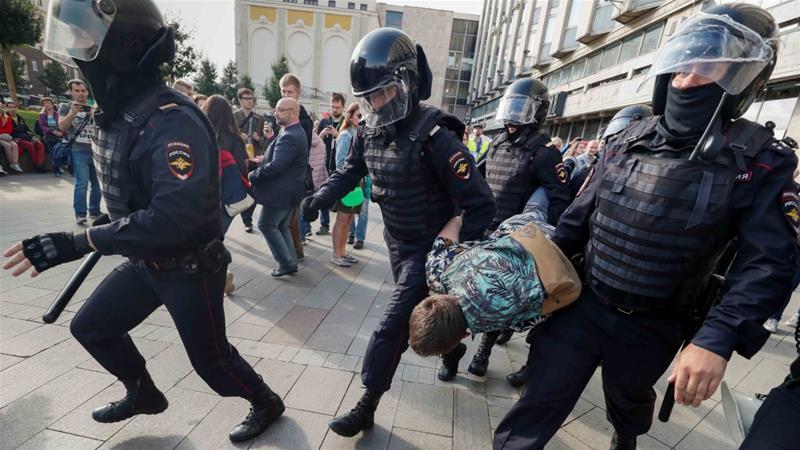Global Issues
The resurgence of opposition is worrying the Russian government -By Roman Dobrokhotov

This week, President Vladimir Putin launched the biggest security operation of his 20 years in power. Since the early hours of September 12, raids on apartments and offices were launched across Russia – from Vladivostok in the east to St Petersburg in the west. Those targeted were activists, NGO workers, human rights defenders, journalists and even environmentalists.
The main focus of the campaign was the Anti-Corruption Fund (FBK) founded by opposition activist Alexei Navalny, which over the past few years has released a number of investigations into high-level corruption and exposed the lavish lifestyles of government officials, including Prime Minister Dmitry Medvedev.
While FBK’s headquarters in Moscow were repeatedly searched over the summer, this time security forces raided its offices in 43 cities across the country. The operation was expanded to include a number of other organisations and individuals, including Golos, an election watchdog, activists from the environmental movement Ekovahta, members of the Yabloko party, the parents of Krasnodar journalist Alexander Savelyev and many others.
The formal excuse for most of the raids was the criminal case against FBK, which last month was accused of laundering money. The fund relies exclusively on crowdfunding to operate, but according to the persecution, the transfer of donated funds constituted a criminal offence. Whether this will actually stand in court – even a biased one – is doubtful, but it has given the state security apparatus an excuse to launch the biggest raid campaign since Stalinist times.
It has also allowed it to literally rob FBK and other organisations of funds. These raids have been accompanied by the confiscation of not just documents but also all expensive technology, including phones and computers (and in some cases even coffee machines). At the same time the bank accounts of FBK itself and its employees, along with many activists, journalists and human rights defenders, have been frozen. Even if they are eventually released, it will not be any time soon. In this way, the Kremlin has left many political opponents without any means of subsistence.
But what necessitated behind such a massive intimidation campaign?
In late spring, FBK activists and other members of the opposition launched a campaign to collect signatures and register as candidates for the local duma elections. City dumas are rather powerless bodies which discuss and vote on local policies as a measure of formality; as a result, there has been little public interest in such elections previously.
And yet, even though FBK members managed to collect the required number of signatures, they were denied registration by the local authorities.
In response, FBK and other opposition candidates who were disqualified rallied the public to take to the streets and protest. This resulted in a series of demonstrations, which the Ministry of Interior responded to by deploying an ever-growing force ordered to brutally beat and detain. Thousands of people were arrested and dozens of protesters were charged with criminal offences. This, however, did not dissuade people from protesting.
The overreaction of the Kremlin increased public outrage and dissent. Its actions helped the opposition immensely in transforming an otherwise banal vote for the largely powerless city dumas into a major society-wide cause and a rallying point for opposition-minded people.
After scoring a major victory by demonstrating its ability to mobilise a large number of people in the capital, the opposition did not stop there. It was determined to make the most out of this unique political moment.
Since FBK and other opposition activists were barred from running, Navalny’s team came up with a plan called “smart voting”. The premise was to rally its supporters to vote for anyone who can beat the candidate of the ruling United Russia party at any given city district.
This strategy turned out to be quite successful. In Moscow, the ruling party lost some 13 seats; in the new 45-member city duma, it will hold only 25 (down from 38). Its losses would have been even bigger, perhaps it would have even failed to gain a majority, were it not for a mass campaign of falsification in some districts. While the new make-up of the city duma will not necessarily undermine United Russia’s grip on administrative power, the vote has demonstrated that the ruling party has lost the capital.
The raids came just days after the results of the election were announced. Clearly, the mass mobilisation over the summer which culminated in the vote worried the Kremlin so much that it had to launch a nation-wide operation of intimidation against political activists.
So far there has been no major reaction from the international community on this sweeping operation. Given that there are already sanctions in place, there is not that much else that can be done. That, in effect, means that the opposition is alone in its challenge to Putin.
Will it manage to respond to the growing pressure and intimidation? This question, of course, no one can answer with certainty. While a mass uprising to the scale of Euromaidan is unlikely, people do not seem scared. A couple of years ago, such a “terror” campaign would have shocked people and intimidated them into silence. Today, however, judging by public reactions on social networks, people are angry and ready for action.
The bad news for the Kremlin is that it seems it has used up almost all its intimidation tactics, which do not seem to be working any more.

















